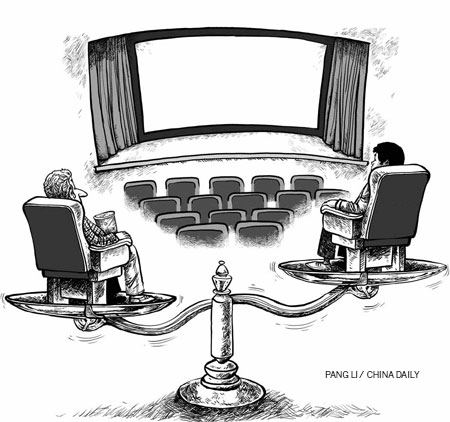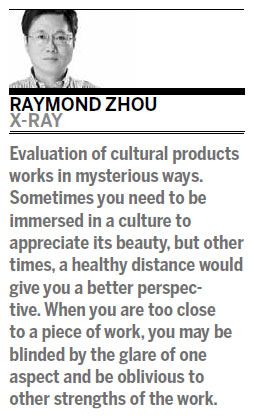Different strokes for different folks
Updated: 2012-12-15 08:26
By Raymond Zhou (China Daily)
|
||||||||

Audiences of different cultures tend to search for different things in the same movie, especially one rich with innuendos. One may not agree with the other perspective, but it is enriching to simply know there is an alternative view.
It is extremely rare for a Hollywood movie to rake in higher box-office grosses in China than in its domestic market. As a matter of fact, it has happened only twice, both this year. The first is the 3D version of Titanic, and the most recent one, which is still running in theaters but looks unlikely to change the final equation, is Life of Pi.
In its first three weeks of release, Ang Lee's lonely tale of a teenager and a tiger on the high seas registered 440 million yuan ($70 million) in the Chinese mainland - in contrast to $60.9 million on its home turf. In a related but less tangible sign, the movie has garnered much better reviews in China than in the US.
If you think Chinese filmgoers flock to the film because of Ang Lee's name, you are at most half right. It is rather how the ethnic Chinese told the story than his ethnicity that has made the movie into a cultural phenomenon.
|
|
Granted, the Taiwan-born director has a high reputation in the Chinese mainland. But he is more respected than loved. Lust, Caution, his biggest movie before Life of Pi, whipped up a frenzy largely because of its strong sexual content, albeit heavily trimmed for its mainland release.
Lee is unlike Jiang Wen or Feng Xiaogang, who command a strong following here; nor does he resemble Zhang Yimou or Chen Kaige, whose art-to-commerce-to-hybrid trajectory has raised many an eyebrow. Lee has been very consistent except for the two flops, Hulk (2003) and Taking Woodstock (2009).
What makes Ang Lee special is his uncanny ability to fuse East and West and, in the process, some surprising discoveries about the inherent discrepancies that divide us - not only perceptions of each other, but how we look at ourselves.
To put it another way, the film master of bridging cultural divide is enlightening even when he succeeds or fails when he does not expect to, thus revealing the frustrations of simultaneously appealing to audiences across the Pacific Ocean.
Life of Pi has got almost identical ratings on Rotten Tomatoes, an American website that aggregates movie reviews, and a Chinese site that aggregate online scores, Mtime. But if you scratch deeper and read what people have actually written, you'll understand why Americans generally see it as a good movie but for most Chinese, it's a great one.
Of the scores of reviews I've read from mainstream American press, I have the impression that the emphasis is on the beauty of the ocean adventure and the difficulty of visually realizing it on the screen - a point Lee himself reiterated during his press tour in China.
Chinese film lovers saw that story, of course, known as "the first story" in the movie. But we instantly grasped the second story, the one about cannibalism and unspeakable cruelty, the one Ang Lee seemingly throws away in the end.
The first batch of filmgoers, usually cineastes with keener observations than the general public, quickly started online discussions about the symbolism and the hidden messages. This, in turn, was built into a crescendo of ever increasing curiosity, which is substantiated by the absolute unusual box-office arc of the second week return surpassing the first week and the third week holding steady.
The magnitude of such strong word of mouth does not come with any advertising budget or star power. It has to come from those who have seen the movie and loved it so much they turn into volunteer promoters. The last time this happened with Chinese cinema was two years ago with Jiang Wen's Let the Bullets Fly, which similarly caused a mania of interpretation (and ran into official trouble because some of the readings made it too subversive).
I'm not in a position to say American audiences did not see layers of meaning in Life of Pi, or if they do, were blase about the complexity. But for the Chinese, the story is intriguing mainly because it is prone to analyses. (It doesn't hurt that the special effects are first class.)
I count myself as pretty acute when it comes to embedded meanings, but after I read some of the reviews, I realized how much wonderful details had eluded me, such as the contour of the floating island as a reclining Buddha.
A running gag among film critics here in Beijing: During a chat among some pundits, one offered, "I believe I've discovered a third story" but another chimed in, "Let me tell you my 'fourth' story first."
The more times I see the movie, the more questions I have. Personally, what has mesmerized me most is Lee's attitude toward Buddhism as embodied in the movie. This is the religion not among those the protagonist basked himself in, yet it is hinted repeatedly. Another question I have: How many treatments did Lee consider before settling on the plain look-at-the-camera narration for the crucial second story? It is so simple, yet so effective.
During one screening, I took time to observe the ridiculous-to-serious-to-shocked response on the faces of many audience members. For those who did not read the book, the revelation would elicit a full spectrum of emotions.
It is quite natural that American filmgoers, including critics, failed to see through the thick coating of culture-specific nuances in Lust, Caution, a quintessential Chinese story for which overtones and undertones are the norm.
It is also to be expected that Chinese audiences are not familiar with the social background of The Ice Storm. But Life of Pi is very international, with an Indian story, a Canadian writer and now an ethnic Chinese director, and ultimately, an American production.
The biggest irony that befell Ang Lee is the cross-cultural pollination of Crouching Tiger, Hidden Dragon. The martial arts epic was greeted with hurrahs in the Western world, but in its home country, where Lee intended as the ideal audience, it was at first brushed off as straying too far from the traditional kung fu genre.
Both word of mouth and box-office returns were lukewarm at best. Only when outside accolades forced Chinese critics to take a second look did we realize it was Lee's departure from conventions and his infusion of subtlety that made it into a masterpiece.
Evaluation of cultural products works in mysterious ways. Sometimes you need to be immersed in a culture to appreciate its beauty, but other times, a healthy distance would give you a better perspective. When you are too close to a piece of work, you may be blinded by the glare of one aspect and be oblivious to other strengths of the work.
For example, a movie with social criticism tends to get high scores because it is relevant and it has a hard time dragging through the censorship grind. But looked back a generation from now, that advantage could fade away as the social situation will have changed. Yet, works on basic human aspirations and emotions may survive. That is why, in Chinese literature, Shen Congwen fares much better than Ba Jin as time goes along.
Another reason we dare not defend or uphold our aesthetic standard is a severe lack of cultural confidence, which results from a lack of critical voices that can be heard on the international stage. We keep telling the world Dream of the Red Mansion is the greatest Chinese novel, but we are unable to show the world where its greatness lies.
Culture thrives on differences. There is a learning curve to understand them. Our job is to make the process enjoyable.
Contact the writer at raymondzhou@chinadaily.com.cn.

 'Taken 2' grabs movie box office crown
'Taken 2' grabs movie box office crown
 Rihanna's 'Diamonds' tops UK pop chart
Rihanna's 'Diamonds' tops UK pop chart
 Fans get look at vintage Rolling Stones
Fans get look at vintage Rolling Stones
 Celebrities attend Power of Women event
Celebrities attend Power of Women event
 Ang Lee breaks 'every rule' to make unlikely new Life of Pi film
Ang Lee breaks 'every rule' to make unlikely new Life of Pi film
 Rihanna almost thrown out of nightclub
Rihanna almost thrown out of nightclub
 'Dark Knight' wins weekend box office
'Dark Knight' wins weekend box office
 'Total Recall' stars gather in Beverly Hills
'Total Recall' stars gather in Beverly Hills
Most Viewed
Editor's Picks

|

|

|

|

|

|
Today's Top News
Health new priority for quake zone
Xi meets US top military officer
Japan's boats driven out of Diaoyu
China mulls online shopping legislation
Bird flu death toll rises to 22
Putin appoints new ambassador to China
Japanese ships blocked from Diaoyu Islands
Inspired by Guan, more Chinese pick up golf
US Weekly

|

|








